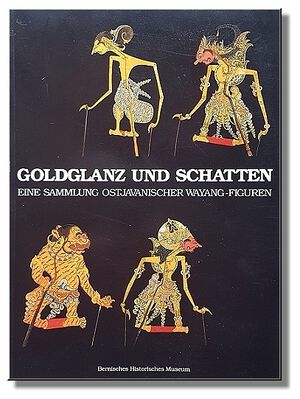Goldglanz und Schatten: Difference between revisions
No edit summary |
No edit summary |
||
| Line 11: | Line 11: | ||
}} | }} | ||
== Summary == | == Summary == | ||
"Les ombres chinoises" conquered the favor of audiences in the East and West from Asia and in Europe from the 17th century onwards. Eduard Mõrike's "King Orplid" is such a shadow play.<p> | |||
Our almost complete set of Javanese figures came to the Bern Historical Museum in 1926 as a deposit from the Barell family and was given to us as a gift in 1973. Dr. Thomas Psota, an expert on Southeast Asia, has been working in our ethnology department for four years and for three years we have had suitable temporary exhibition rooms. These two fortunate circumstances allow us to present our Javanese shadow theater after a 20-year wait in a room designed by Harry Zaugg, stage designer and museum designer, designed exhibition and by means of this catalogue.<br> | |||
They show the artistic figures as actors in a meaningful world theater.<p> | |||
Dr. Ernst J. Kläy. Head of the Department of Ethnology<br> | |||
Dr. Ernst J. Kläy. Head of the Department of Ethnology | |||
Prof. Dr. Georg Germann. Director | Prof. Dr. Georg Germann. Director | ||
[[Category:Books]] | [[Category:Books]] | ||
Latest revision as of 17:00, 13 November 2024
| Title | Goldglanz und Schatten |
|---|---|
| Subtitle | Eine sammlung ostjavanischer wayang-figuren |
| Category | Wayang |
| Author | Thomas Psota |
| Publisher | Bernisches Historisches Museum |
| Published | 1993 |
| Language | German |
| ISBN-ASIN | 3952053708 |
Summary
"Les ombres chinoises" conquered the favor of audiences in the East and West from Asia and in Europe from the 17th century onwards. Eduard Mõrike's "King Orplid" is such a shadow play.
Our almost complete set of Javanese figures came to the Bern Historical Museum in 1926 as a deposit from the Barell family and was given to us as a gift in 1973. Dr. Thomas Psota, an expert on Southeast Asia, has been working in our ethnology department for four years and for three years we have had suitable temporary exhibition rooms. These two fortunate circumstances allow us to present our Javanese shadow theater after a 20-year wait in a room designed by Harry Zaugg, stage designer and museum designer, designed exhibition and by means of this catalogue.
They show the artistic figures as actors in a meaningful world theater.
Dr. Ernst J. Kläy. Head of the Department of Ethnology
Prof. Dr. Georg Germann. Director

